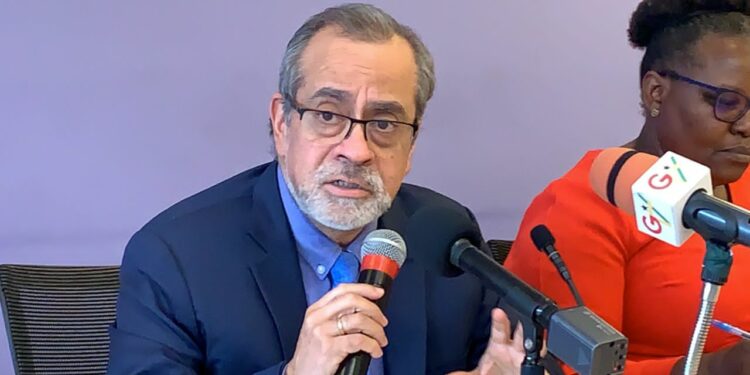Increased domestic resources needed to bridge $600m education financing gap – Dr Saavedra says
Global Education Director of the World Bank, Dr Jaime Saavedra, has averred Ghana needs to increase its domestic mobilisation resources to bridge a financing gap of over $600m in its education sector.
Government in the 2023 Budget Statement allocated 12% of its total expenditure (GHS 205bn) to the education sector. The allocated amount is three percent short of the international benchmark of at least 15% budgetary allocation.
This translates into some GHS 6.15bn ($615m) financing gap in the education sector for this year.
Dr Saavedra, responding to a question posed to him by norvanreports on the Bank’s willingness to commit extra funding to the country’s education sector in view of government’s inability to adequately fund the sector, remarked funds from the World Bank, cannot be used in the place of mobilised domestic resources to “permanently” bridge a financing gap in the education sector or any other sector for that matter.
According to Dr Saavedra, funds from the World Bank are only meant to support national reforms in a particular sector.
“External financing is usually less than what is generated domestically by the country, investments by multilateral s like the World Bank are smaller compared to domestic mobilisation.
“Our investments are to support national reforms, in the education sector, it doesn’t make sense to permanently bridge the 3% financing gap and finance it. It usually has to be done by the government.
“You will never see World Bank resources being used to permanently close or bridge a financing gap, because that has to be done with domestic resources which is by the government increasing the tax base,” he quipped.
The World Bank has had productive engagement in the country’s education sector for the last three decades, helping to improve access and quality of education in the country.
The World Bank is currently engaged in the Ghana Accountability for Learning Outcomes Project for an amount of US$150M IDA and US$64.5M TF which was approved on October 29, 2019, and became effective on April 16, 2020.
The Project includes three Trust Funds comprising: (i) US$24.4 million from GPE TF0B0846; (ii) US$30.0 million[1] from the Global Partnership for Results Based Approaches (GPRBA) to support the Ghana Education Outcomes Project (GEOP), the first of its kind in Sub Saharan Africa; and (iii) US$14.8 million from the recently closed GPE COVID-19 Accelerated Financing. The project has disbursed US$47.55M (33.59%) out of the US$150M IDA commitment.
Another, is the Project Development Objective is to improve the quality of education in low performing basic education schools and strengthen education sector equity and accountability in Ghana. The implementation process is structured around five components namely strengthening teaching and learning through support and resources for teachers; strengthening school support, management, and resourcing; strengthening accountability systems for learning; Technical Assistance, institutional strengthening, monitoring, and research; supporting the national COVID-19 response for continued learning, recovery, and resilience in basic education.
The parent project and additional financing were declared effective on April 16, 2020, and June 21, 2020, respectively. According to the latest ISR, both the progress toward achievement of PDO and the overall Implementation Progress are rated satisfactory.
The third education related project being carried out by the World Bank, is the First Africa Higher Education Centers of Excellence for Development Impact (First ACE Impact) Project (US$60M IDA Credit) which was approved on March 27, 2019, and became effective on August 19, 2019. The project comprises 5 countries from West Africa (Burkina Faso, Djibouti, Guinea, Senegal and Ghana) and the Association of African Universities.
The status of implementation and results achieved in the nine (9) Ghana Centers are commendable. Ghana’s ACEs are training masters, PhD and professional short course students and pursuing research in areas such as coastal resilience, infectious and genetic diseases, food security, energy & environmental sustainability, water and sanitation.
The Ministry of Finance has submitted its request for restructuring and closing date extension of the First ACE Impact Project until June 2025.
[1] This includes Government contribution of US$4.5M







